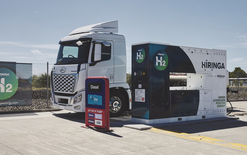EVs to cut oil consumption

Unlike previous BP Energy Outlooks, this year’s Outlook is described with reference to the ‘Evolving Transition’ scenario, which assumes that government policies, technologies and societal preference continue to evolve at a manner and speed similar to the recent past. “BP’s strategy has to be resilient and adaptable to significant changes in the energy industry. This Outlook considers the possible implications of some of these changes and helps inform our long-term planning. We cannot predict where these changes will take us, but we can use this knowledge to get fit and ready to play our role in meeting the energy needs of tomorrow,” explains Bob Dudley, group chief executive. Transport analysis The oil and gas giant believes that there will be a 100-fold growth in electric vehicles by 2040, with its chief economist Spencer Dale painting a world in which we travel much more but instead of using private cars, we increasingly share trips in autonomous vehicles. In the ET scenario, 30 per cent of car kilometres are powered by electricity by 2040 from almost zero in 2016. At the same time, the number of EVs is set to increase from 3 million today to over 320 million by 2040, representing roughly 15 per cent out of a total car fleet of 2 billion. As a result, fuel demand from the car fleet is forecast to dip to 18.6 million barrels per day in 2040 from 18.7 million bpd in 2016, when it represented around one-fifth of total oil demand, according to BP. BP expects autonomous vehicles to become available in the early 2020s. Their initial high cost means the vast majority of the cars will be bought by fleets offering shared mobility services. The average electric car is expected to be driven about two and a half times more than an internal combustion car, according to Dale. Fuel analysis In the ET scenario, renewable energy is the fastest growing source of energy, accounting for over 40 per cent of the increase in energy supplies. By 2040 oil, gas, coal, and non-fossil fuels are projected to each provide around a quarter of the world’s energy. Natural gas grows much faster than either oil or coal, with its share in primary energy overtaking coal and converging on oil. Oil will grow, although is projected to plateau in the 2030s. Coal consumption is broadly flat, with its share in primary energy declining to 21 per cent, the lowest since the industrial revolution. “We are seeing growing competition between different energy sources, driven by abundant energy supplies, and continued improvements in energy efficiency. As the world learns to do more with less, demand for energy," says Dale.





